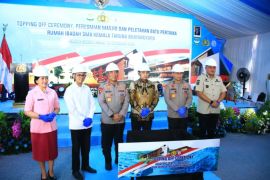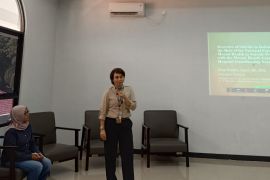However, to achieve this, the country needs to go beyond gradual growth and aim for a drastic, structural overhaul of its economic landscape.
This is, essentially, a challenge for Indonesian society as a whole.
A recent report from McKinsey Global Institute outlines a road map with practical steps for Indonesia to achieve this goal.
As promising and feasible as the road map may seem, it will only yield the desired outcomes if Indonesia is prepared to undertake the challenging task of restructuring the foundation of its national economic development.
In this context, two factors are paramount: a radical increase in national productivity and the creation of an ecosystem that allows for a threefold rise in the number of medium and large companies.
The report, “The Enterprising Archipelago: Propelling Indonesia's Productivity,” offers insight into the two factors considered determinants of Indonesia’s high-income goal, one of which is the growth of the capital-per-worker ratio.
A favorable trend in this ratio must be supported by the growth of highly competitive business sectors, which will, in turn, lead to an increase in the number of enterprises classified as medium or large.
From potential to productivity
Ranked 16th globally in terms of nominal GDP, Indonesia is far from economically weak. Instead of measuring Indonesia’s wealth, the core question should revolve around whether the country can transform its potential into a noteworthy source of productivity.
It is worth noting that over four decades have passed since Indonesia launched its fight against extreme poverty, which remains a major obstacle to economic growth.
To achieve high-income status, the Southeast Asian country must ensure tangible outcomes from efforts to boost its annual labor productivity rate from the stagnant 3.1 percent it has had since 2000 to 4.9 percent.
This is important because countries with the desired economic status have a per capita income of at least US$14 thousand.
Beyond focusing on work efficiency, Indonesia must get around the challenge of generating added value in the increasingly complex and competitive economic chain.
It is precisely in this context that companies come into play. Not just any companies; they must be firms possessing the capacity to grow, adopt technology, generate quality job opportunities on a broad scale, and expand across sectors and regions.
Indonesia’s lack of such enterprises presents a signal for the country to solidify its rather impotent national structure of economic incentives.
An unsupportive business climate has hindered many small businesses from growing and competing on a level playing field.
It is safe to say that such a climate constitutes the vicious mix of administrative obstacles, limited funding schemes, and inconsistent regulations, which reserves the joy of running large-scale businesses only to a handful of actors.
Toward an institutional revolution
With these factors considered, the target to double the number of giant enterprises could be viewed as more than just a quantitative ambition. This tall-yet-reachable goal calls for an institutional revolution that transforms bureaucracy into a growth enabler rather than a burdensome affair.
Chris Bradley, a director at the McKinsey Global Institute, said that Indonesia ought to triple the number of medium-sized and large companies, contending that this challenging approach is expected to give birth to high-quality job opportunities and stimulate the growth of high-value-added sectors.
In this sense, he specifically addressed sectors linked to manufacturing, agriculture, and services.
In the same report, Managing Partner of McKinsey & Company’s Indonesia Office, Khoon Tee Tan, stated that Indonesia’s path to high-income status would largely depend on its ability to unleash five forms of enabling capital.
He named these capital types as a strong financial system, a solid education system, business-friendly rules and regulations, world-class infrastructure, and an ecosystem supporting startups and small businesses.
“With a focus on these fields, Indonesia can create an environment that is more supportive of a higher level of productivity,” he remarked.
The real point the report aims to highlight is not just the five types of capital per se—it is the necessity for Indonesia to fully leverage all of them in a well-coordinated manner.
The urgency of financial reform
Regarding financial capital, Indonesia’s economic ecosystem has relied too heavily on conservative banks for far too long, overlooking the importance of adapting to the modern needs of today’s business world.
At the same time, for startups to really grow, there needs to be a more welcoming environment for private credit and capital markets -- both are of the essence.
That said, thoroughly overhauling financing structures and embracing more progressive fiscal incentives are of the utmost urgency. This is a matter of letting companies grow and being freed from the crippling pressure of liquidity.
Speaking of human capital, Indonesia must find and execute a more sophisticated approach than merely expanding access to education.
The real deal in Indonesia’s context is the mismatch between what industries actually need and the skills the education system is producing in the country’s talent pool.
In addition to talents with shiny academic backgrounds, this country also needs ready-to-work individuals who bring flexibility, adaptability, and creativity to the table.
Higher education institutions should play a key role in addressing this issue. Their tendency to stick with outdated curricula that overlook the needs of the job market is a major factor contributing to the weak link between education and industry in the country.
Overcoming institutional barriers
However, institutional capital remains standing as a tall wall preventing Indonesia from achieving the desired reform.
This wall is mostly made up of unsynchronized laws, complicated permit-obtaining processes, and legal uncertainty.
Simplifying regulations to improve Indonesia's image and build trust among businesses is essential if the country is to become a magnet for global investment.
The government must assure the business community of regulatory consistency and demonstrate its willingness and capability to be a reliable partner.
Infrastructural capital should not be underestimated or viewed narrowly as just building more roads or ports to improve connectivity in the traditional sense.
Given the closely linked nature of technological and business developments, it is fair to say that digital infrastructure is becoming the new backbone of modern economies.
This type of infrastructure is inseparable from internet connectivity, which, if not addressed properly, could widen the gap between businesses in major urban centers and those in underdeveloped regions.
Balanced development of spatial and digital infrastructure, especially in regions outside the densely populated Java Island, is key.
Last but not least, entrepreneurial capital. The Indonesian nation undoubtedly has a strong spirit of entrepreneurship -- a valuable asset that can quickly lose its impact without a supportive system to nurture and scale it.
Fully tapping into this particular form of capital requires Indonesia to create avenues for innovative financing mechanisms -- such as venture capital and private equity-- that can spur growth while keeping risks manageable.
Just as important is the need for the government to start seeing startups as future pillars of the economy rather than merely as trendsetters of digital lifestyles.
Making a leap to the level of high-income countries is, in actuality, not a rhetorical narrative easily instrumentalized in political campaigns. Rather, it is a painful, arduous, and negotiation-heavy process requiring the audacity to make unpopular decisions.
Blindly catering to political interests at the expense of economic growth is undeniably counterproductive. Turning away from innovation while pampering an inefficient bureaucracy is nothing short of sabotaging the future of the next generation.
The path worth pursuing here is one that creates space for healthy business dynamics, empowers local businesses to go global, and paves the way for a truly competitive business climate.
All things considered, fully and harmoniously leveraging these five forms of capital with consistency is Indonesia’s true ticket to becoming a high-income nation.
Related news: Productivity, innovation vital for high-income country status: Govt
Related news: Indonesia needs 6-7% economic growth to become developed country
Translator: Hanni Sofia, Tegar Nurfitra
Editor: Primayanti
Copyright © ANTARA 2025












